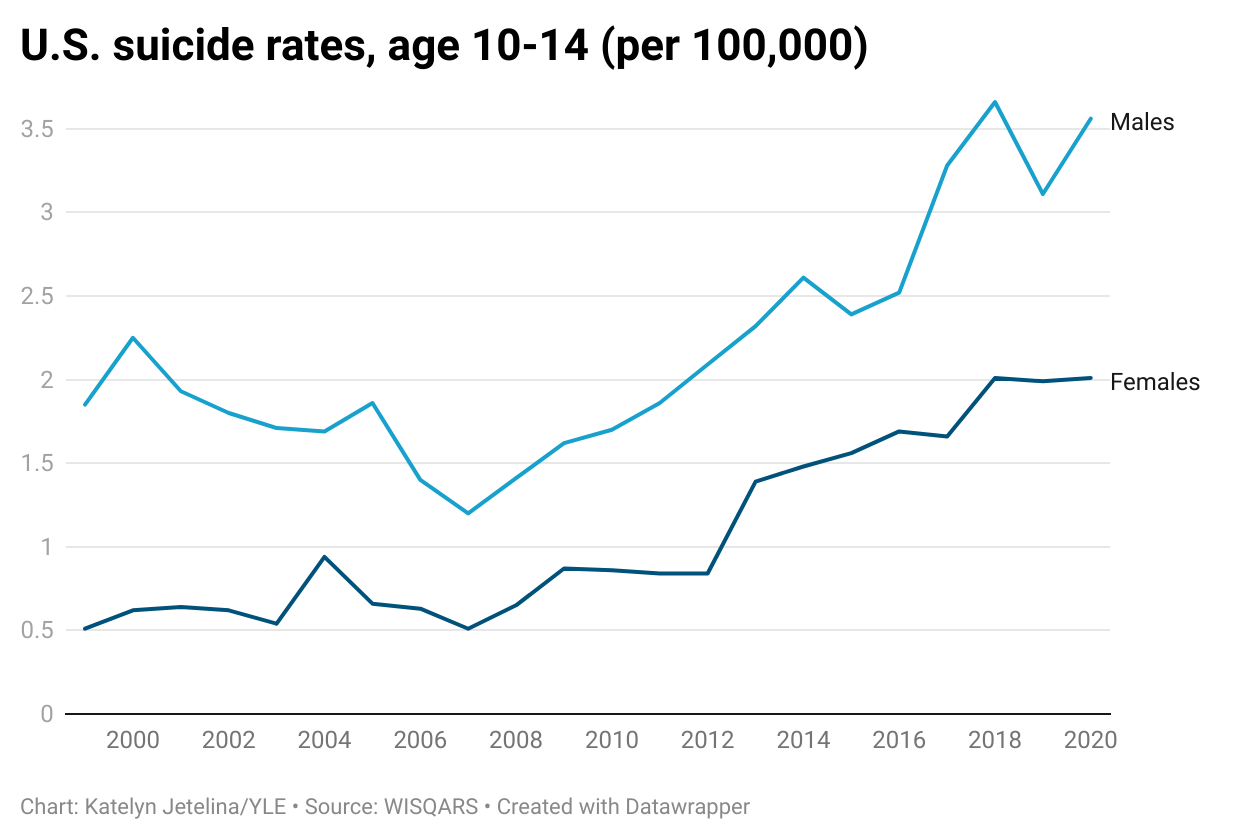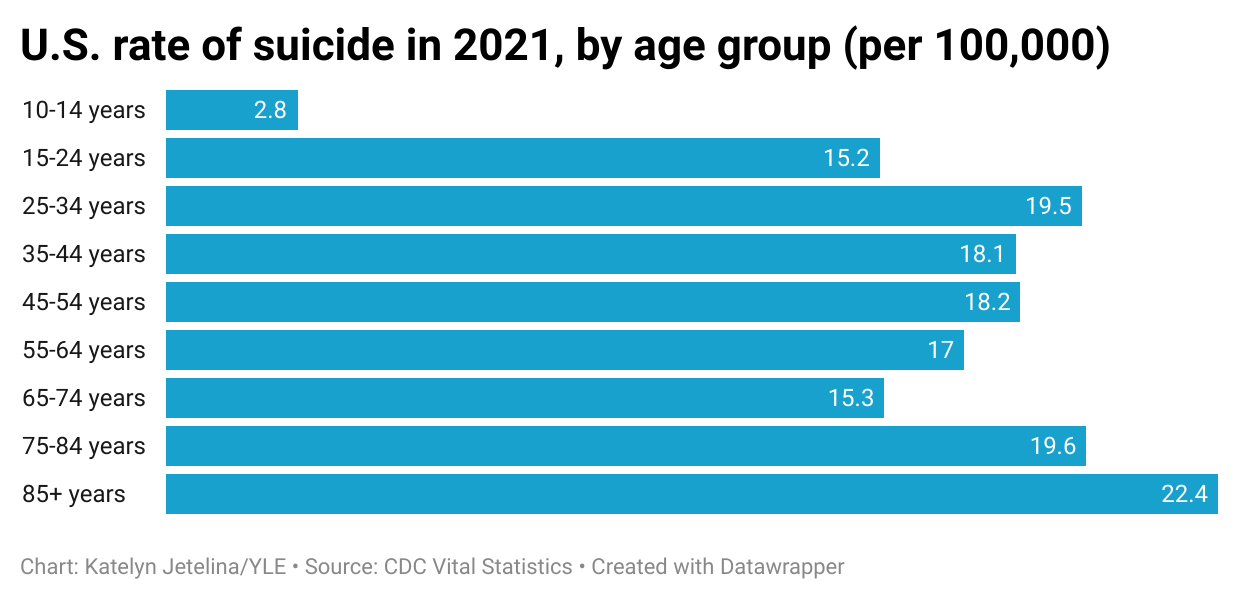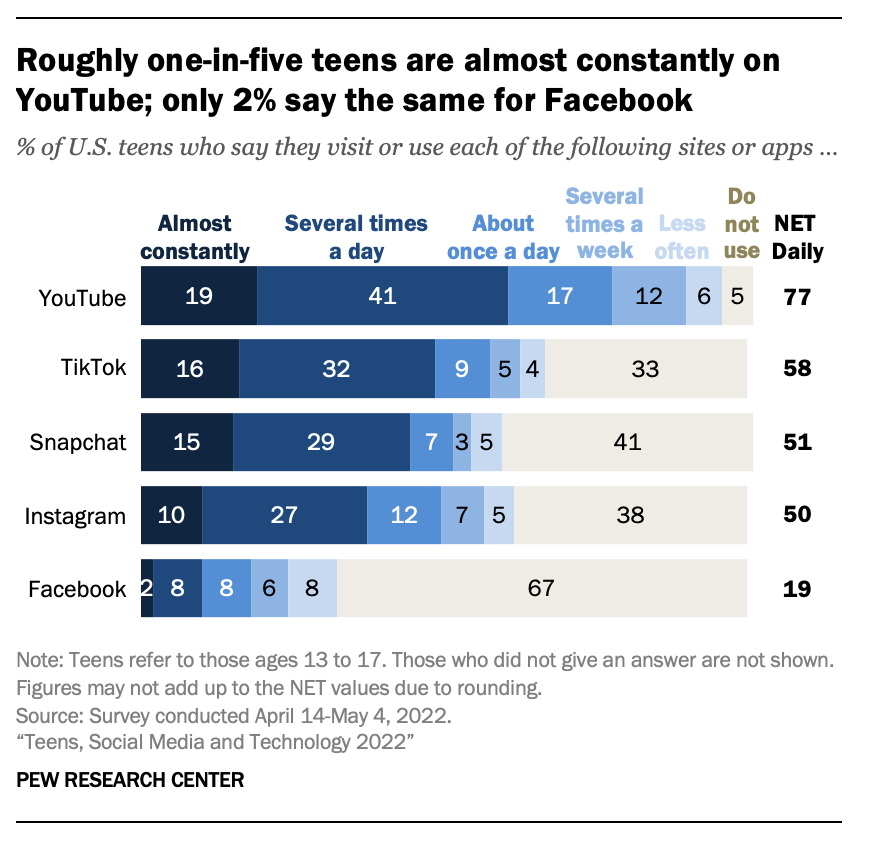This post contains sensitive information, including a discussion of suicide. If you are in need of help, there is an abundance of resources on the National Suicide Prevention Hotline website, which includes an anonymous chat function and a direct line at 800-273-8255.
Protecting youth from the potential negative mental health effects of social media is front and center in the mass media, in conversations around dinner tables, and in federal- and state-level bills.
Is the teen mental health crisis a real thing?
Yes. Rates of mental health problems have continually increased among young people over the past 15 years, regardless of how you measure it:
In 2021, 42% of U.S. high school students reported “persistent feelings of sadness or hopelessness,” up from 28% in 2011. The increase was especially dramatic among girls.
According to diagnostic measures (structured interviews by a trained professional), depression has increased 7.7% in U.S. teens—and 12% among girls—between 2009 and 2019.
According to U.S. death certificates, suicide rates among youth ages 10-14 increased 139% for girls and 70% for boys since 2012. However, this is a bit difficult to interpret given low the rates to begin with for girls.
(The trends are increasing fast among teens. But, for perspective, the rates of suicide are significantly higher in adults.)
Is this rise due to social media?
Teens use social media. A lot. Almost one in five teens use YouTube “almost constantly.” Nearly half of teens use TikTok (48%) and Snapchat (44%) several times per day. And the total hours of use have increased in recent years among teens.
But using social media doesn’t necessarily equate to mental health problems. Correlation doesn’t always equal causation. And, to make things more complicated, there are harms and benefits of social media.
Harms of social media
We have a lot of correlational evidence, and some—but not much—causal evidence of the harms of social media on teens' mental health.
Correlational studies ask teens how much time they’re spending on social media, and ask them about mental health. In general, these point to weak but statistically relevant correlations between social media use and lower teen well-being.
In terms of causal evidence, we have a couple of studies:
Some studies randomly assigned people (both adults and teens) to stop using social media (and others not to stop) and then evaluated their well-being. The results of these studies are mixed. Variability seems to depend on the details of the design: How long did they stop using social media? Did they “detox” completely or just reduce the time spent? What are they using social media for?
Other studies have taken advantage of circumstances that naturally occurred in the world to mimic an experimental design. One study looked at when Facebook was introduced on different college campuses (which varied randomly) and found that after Facebook showed up, rates of mental health concerns increased. A few others (like this and this) look at the introduction of high-speed Internet in different areas and found associations with poorer mental health after its introduction. Generally, these do not address social media specifically.
What is clear is that we need more research with more rigorous designs.
Benefits of social media
Competing with these harms are studies that show social media has benefits for mental health, too. Teens report that social media is important for:
Helping them stay connected with friends
Meeting like-minded peers
Exploring their interests
Learning
Discovery
These benefits can be especially important for those who may be socially vulnerable in their offline lives, like LGBTQ+ youth.
What else could explain it?
Assessing causality means understanding what other factors may also explain the rise of mental illness among teens. A few alternative explanations have been proposed:
Rising income inequality
Wars
Violence and access to firearms (suicides)
Global financial crisis
Racial inequality
Academic and social pressures
Political views on current events
Climate change
The opioid epidemic
Unhelpful narratives around mental health
Of course, many of these explanations may be intertwined with and amplified by social media, but the short answer is that we likely can’t blame social media alone. Mental health is complicated, and there is unlikely to be a single, simple explanation for a large-scale phenomenon like this one.
So, what should we do about it?
We’ve got a few options:
Option 1: Do nothing until research is “settled” on the issue before taking legislative action. Unfortunately, this may require a “burden of proof” that is rarely, if ever, established in psychology research. In this case, some evidence of harm, even if imperfect, may need to be enough to drive change.
Option 2: Put it on the parents. Parents certainly play a hugely important role in teens’ relationships with social media. Evidence supports parents’ active involvement in kids’ digital lives through ongoing conversations, reasonable limits, and appropriate monitoring. But can (and should) they manage it alone? If large-scale policy changes create safer social media platforms, individual disadvantages are minimized.
Option 3:Ban it among minors.No states have outright banned it among minors yet. This option would limit access to its benefits and would limit kids’ opportunities to practice using social media in safe and healthy ways prior to adulthood.This has changed substantially since this piece was originally published. Many states, like Arkansas and Utah, have passed bills that limit social media use. In one case (Florida), it’s banned among kids under 16.
Option 4: Put reasonable protections in place. Social media is probably more like cars than drugs. We want protections in place (seatbelts, airbags, drivers’ ed), but an outright ban may go too far. Some options include: raising the minimum age from 13 to 15 or 16; requiring age verification of some kind; limiting recommendations of harmful or problematic content; limiting overall time spent (e.g., via forced “breaks” or overall time limits); and limiting targeted advertising.
Bottom line
We have some evidence that social media is playing a role in the teen mental health crisis, but that evidence is not definitive. And social media can play a positive role, too. It is highly unlikely that social media is the only cause of mental illness among children. We can certainly take steps to make social media a healthier place, but if we truly want to support teens’ mental health, this is only the start.
Love, YLE and JN
Dr. Jacqueline Nesi is a clinical psychologist, research professor at Brown University, and mom to a toddler. She writes the newsletter Techno Sapiens about psychology, technology, and evidence-based parenting.
“Your Local Epidemiologist (YLE)” is written by Dr. Katelyn Jetelina, MPH PhD—an epidemiologist, data scientist, wife, and mom of two little girls. During the day she works at a nonpartisan health policy think tank and is a senior scientific consultant to a number of organizations, including the CDC. At night she writes this newsletter. Her main goal is to “translate” the ever-evolving public health science so that people will be well-equipped to make evidence-based decisions. This newsletter is free thanks to the generous support of fellow YLE community members. To support this effort, subscribe below.












I expect the biggest problem is the news. Teens are at the age when they really begin to see the world as a whole.
It's frustrating to me that none of the options are to turn off the algorithms various social media platforms use. Showing people a time ordered feed of the people they purposefully follow first with the option of discovery as something they have to click over to see might do wonders for a majority of all of us.
Dr. Jetelina & Dr. Nesi, I am curious about your thoughts on Yondr phone pouches in high schools. My child's high school is implementing a Yondr pouch policy beginning this fall. Currently, each classroom has numbered phone"sleeves". Students are required to place their phone in a sleeve at the beginning of each class and they take it when they leave at the end. The sleeves are numbered so teachers can tell quickly whose phone is there and whose might be missing. However, my understanding is that some teachers enforce this rule and some don't (which I'm sure is par for the course in a large school).
The new policy would require each student to place their phone (also smartwatches and AirPods) in a locking pouch when they enter the building. It remains in the pouch for the entire day and staff members with handheld unlocking devices "free" the phones when students leave at the end of the day.
The reasoning for this is that students spend too much time on their phones and too little time interacting with each other and socializing. The administration believes that this will benefit students' mental health by creating a more inclusive environment, kids talking in the cafeteria instead of looking at phones, etc.
I have reservations about this (for a variety of reasons). I believe that it will further isolate the "fringe" kids. For some, lunch period is stressful because they don't have a group to sit with in the cafeteria. Those kids rely on their phones to have some outside interaction during an otherwise lonely time during the day. I know my son uses his phone sometimes to text friends whom he doesn't otherwise see in his classes, so they catch up, make plans for after school, etc. He would have less social time with those friends if he has no contact during the day.
I realize this isn't specifically related to social media because the phone is just a device -- lots of kids have phones and don't have social media. My kids (ages 17 and 12) both use phones for texting, Facetime with friends, and other purposes but neither has any social media apps or accounts (17yo isn't interested; 12yo asks but we're waiting).
However, our kids live in a digital world. I don't think literally locking up their phones during the day teaches them how to properly manage the digital environment. I want my kids to know when it is or is not appropriate to use their phone, and for what purposes. My 17-year-old checks his phone in between classes because the majority of their academic work is posted to Google Classroom (our district provides every student with a Chromebook), so he's always looking at his phone for Classroom notifications, changes to assignments, comments from teachers, etc. In addition, the groups and activities all communicate using apps like GroupMe or Discord. So, when club plans or after-school activities change, he receives that communication on his phone. I think preventing students from having any access will make things unduly burdensome without serving the intended purpose.
I would be so curious to hear your thoughts on phone use among kids, generally, even outside the social media context. As always, thank you for proving timely and data-driven information!